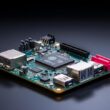A facility that stores, processes, and distributes data and applications is known as a data center. It also centralizes the information technology operations and equipment of an organization. Data centers are vital to the smooth running of day-to-day operations since they are responsible for storing an organization’s most essential and valuable assets. As a direct result of this, safety and reliability are among the most important concerns for any company.
The public cloud has since brought about a shift in the traditional model of data center infrastructures, which previously consisted of strictly managed and physically present settings. The vast majority of sophisticated infrastructures have transitioned from on-premises physical servers to a virtualized infrastructure that is capable of supporting applications and workloads across multiple cloud environments. Workloads from applications are moving from one data center to another, as well as between private, public, and hybrid clouds, especially the container registry by JFrog.
Data centers help businesses in many ways, so we made a list of the most important ones.
Why Use Data Centers In Digital Infrastructure?
Data centers and data entry are the backbone of modern information management. Data entry ensures accurate and organized data input, while data centers house and process vast amounts of information. Together, they enable businesses to efficiently store, retrieve, and analyze data, driving productivity and innovation across industries. However, let’s try to understand why the companies are looking to use data centers in this digital infrastructure.
Maximum Security

If anything unusual happens to your company server, data centers provide both managed and unmanaged colocation services, as well as a secure facility, rack space, and internet connection to guarantee that your business can continue to run properly. If the security of your client’s personal information is critical to your company’s success, you should consider employing a data center to store and manage your data. Companies benefit from an even greater degree of security when they engage with a supplier that has many data centers positioned across the globe.
Reducing Costs
According to some industry experts, power outages and other interruptions damage the United States economy anywhere from $200 billion to $500 billion each year. The use of data centers assists in mitigating some of this loss. They employ a system that can withstand bad power conditions, as opposed to generators and surge suppressors. It requires a significant amount of energy to start and maintain generators and surge suppressors. They are also vulnerable to power spikes and other sorts of electrical disturbances, to which they are not immune. All of these factors contribute to the ever-increasing price of power.
The cost of both power and cooling has risen significantly in recent years. The objective of people in charge of data center management should be to maximize availability while minimizing power usage. Uninterrupted power supply systems with extremely high efficiency may be useful in reaching this goal. Things that were not available merely a few years ago are now available for all.
Protecting Power
When data control is outsourced, a power outage or natural disaster doesn’t have as much of an effect. A business that makes its electricity could lose a lot of money if the power goes out for reasons both natural and man-made. This is because on-site servers are more likely to have connectivity issues. Even a brief power outage—as little as 1/50 of a second—can set in motion a cascade of events that render information technology (IT) devices useless for 15 minutes to several hours. When they cause data loss, power outages on the premises are irreversible.
Traditional data storage techniques cannot compete with the degree of security provided by data centers. The challenges and consequences associated with data loss are growing increasingly serious. Storage systems, servers, and network devices of today use components that have been reduced to the point that they are unable to survive power conditions that prior generations of equipment could handle. A data center provides stable storage that is devoid of the issues that might arise with portable technology.
Improved Efficiency
The development of a data center has a substantial environmental effect; hence, the alternative approach has a greater environmental impact. As a result, we may speak of increased operational efficacy.
The electricity that the electrical network provides is one area where we find opportunities for increased efficiency. The majority of data centers use power generated from renewable sources and the handful that does use energy generated in a way that does not replenish itself do so only in extraordinary situations or when there is no electricity production.
Greater Reliability
During the development and building of data centers, reliability, and efficiency are taken into account. They have backup generators and redundant power sources, so even if there is a power outage due to natural causes, your data will remain safe. Moreover, they have strict environmental controls in place to protect your equipment from harmful causes such as dust, water, and extreme temperature variations.
Additionals:









